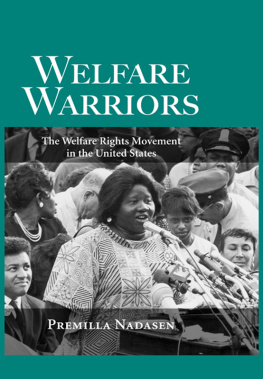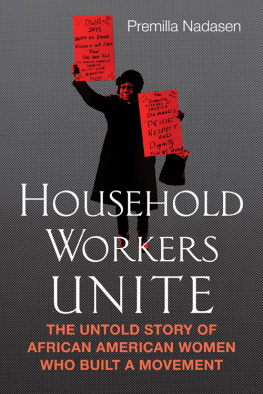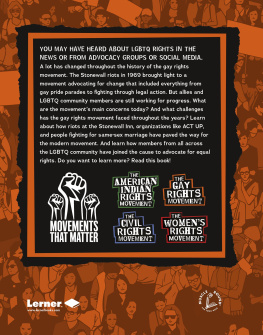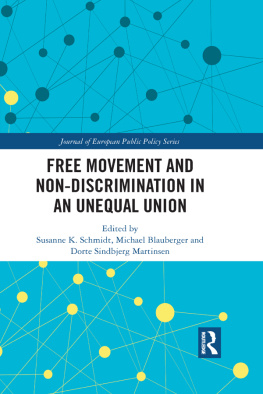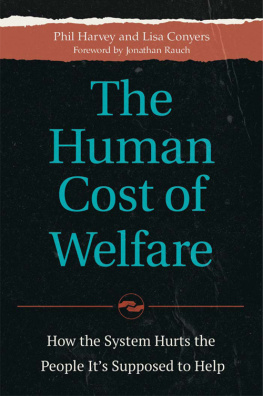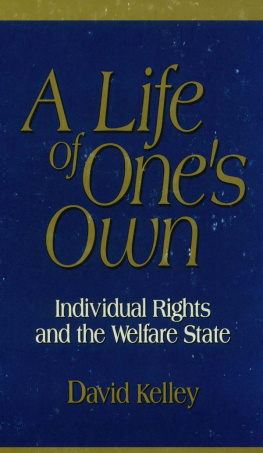WELFARE WARRIORS
WELFARE WARRIORS
The Welfare Rights Movement in the United States
PREMILLA NADASEN

First published 2005 by
Routledge
711 Third Avenue
New York, NY 10017
www.routledge-ny.com
Published in Great Britain by
by Routledge
2 Park Square
Milton Park, Abingdon
Oxon OX 14 4RN
www.routledge-co.uk
Copyright 2005 by Premilla Nadasen
Routledge is an imprint of the Taylor and Francis Group.
All rights reserved. No part of this book may be reprinted or reproduced or utilized in any form or by any electronic, mechanical or other means, now known or hereafter invented, including photocopying and recording, or in any information storage or retrieval system, without permission in writing from the publishers.
10 9 8 7 6 5 4 3 2 1
Library of Congress Cataloging-in-Publication Data
Nadasen, Premilla.
Welfare warriors : the welfare rights movement in the United States / Premilla Nadasen.
p. cm.
Includes bibliographical references and index.
ISBN 0-415-94578-X (hc : alk. paper)ISBN 0-415-94579-8 (pb : alk. paper) 1. National
Welfare Rights Organization (U.S.)History. 2. Welfare rights movementUnited States
History20th century. 3. African American women political activistsUnited States
History20th century. I. Title.
HV97.N34N33 2004
362.5'82'06073dc22
2004010468
Table of Contents
This book was based on archival sources, official published documents, interviews, and the previous research of other scholars. I would first like to thank all those who have provided the groundwork for my research. Many scholars, activists, and participants wrote about the welfare rights movement over the past several decades and produced case studies and analyses upon which I could build. Guida West, who pioneered research on the welfare rights movement, very generously shared her interviews with me early on in this project.
I also conducted a number of interviews for this research. I found the interviews illuminating and was thrilled to have conversations with people who had been there. At the same time, what people remember about the movement 30 or 40 years later is colored by contemporary welfare politics, their own political development, and pride and/or regret about their own involvement. I would like to extend my gratitude to all those people who took time out of their busy lives to speak with me and reminisce about their participation in the welfare rights movement.
The most valuable information I could gather about the movement was from the archives themselves. Archives are notoriously incomplete, and represent only what people thought worth saving. So much of what transpired in the movement was not captured in print and thus is lost forever to historians. Nevertheless, the written record gives us a limited window into a fascinating historical period. Understanding the words, voices, and aspirations of those involved in the welfare rights movement in the context of the period is part of what makes this such a significant movement. My goal has been to document, in particular, the voices of women welfare recipients and put their vision at the center of my scholarship. In carrying out this project archivists and librarians at the State Historical Society of Wisconsin, the Ohio Historical Society, the Moorland-Spingarn Research Center, the Lyndon Baines Johnson Library, and the Columbia University Rare Book and Manuscript Library all provided invaluable assistance.
A number of institutions extended financial support enabling me to complete this project. Columbias Presidential Fellowship saw me through the first several years of the writing of my dissertation. A summer fellowship from the Martin Luther King Papers Project at Stanford University trained me in analyzing primary sources and fostered a sense of community and collaboration that I hadnt previously experienced in academia. The Lyndon Baines Johnson Foundation gave me a grant to conduct research in the Johnson Presidential Library. The Williams College Bolin Fellowship provided a welcome retreat in a bucolic setting that facilitated writing and also introduced me to some wonderful people. A one-year grant from the Aspen Foundation gave me the time and space to complete the dissertation. Awards from the Research Foundation of the City University of New York as well as the Queens College Presidential Fellowship enabled me to make the revisions that transformed the dissertation into a book.
Queens College has been a wonderful place to work for the past six years. The diversity of the student body, their life experience, and their maturity make it a pleasure to walk in to my classroom. My colleagues and the many people I have befriended at Queens are not only brilliant scholars, but demonstrate an admirable commitment to teaching and public education. It is an academic setting where teaching and scholarship are truly balanced, as it should be. My chair, Frank Warren, is a gem, and has done everything in his power to help me through the difficult processes of manuscript revisions and tenure.
There are many people who have provided support, have generously volunteered (or acquiesced) to read the manuscript, or portions of the manuscript. My dissertation committee membersEric Foner, Betsy Blackmar, Manning Marable, Phil Thompsonwere outstanding for their insightful comments, and the depth and breadth of knowledge they brought to my work. Eric Foner was a responsible and attentive chair, despite his many other commitments. Betsy Blackmar provided much needed encouragement from the very earliest stages of this project. Others who read all or portions of the book include: Eileen Boris, Ula Taylor, Marion Kaplan, Mimi Abramovitz, Daryl Scott, Frank Warren, Nancy Hewitt, Tami Friedman, Nora Eisenberg, the CUNY Faculty Fellowship Publications Program, Charles Dew, and the faculty committee of the Oakley Center for the Humanities at Williams College.
Barbara Ransby has been a political ally and very close friend since my first year of college. Her consistent support, encouragement, and political wisdom has helped me through graduate school and the arduous process of book writing. She read whatever I sent her, pushed me to do my best with her critical eye, and inspired me with her political vision. Barbara, Peter Sporn, Jason, and Asha are very much an extension of my own family. Robyn Spencer is a very dear friend who has been a colleague and companion for many years. Her critical insight, common sense, and communal values are a wonderful combination. Robyn has consistently worked to create communities of support to acknowledge the unacknowledged and to develop an alternative, more egalitarian set of values. She has been a model, both as a scholar and an academic. Many years ago Phyllis Englebert helped me write my first published essay for a progressive weekly paper in Ann Arbor, Michigan. It was fitting that she so generously volunteered to help edit my first published book. Not only a talented writer, Phyllis has also remained committed to an organizing tradition despite the ups and downs of radical politics in the past two decades.
Phyllis was one of a crew of rabble-rousers from my Michigan days. Many of the friends I made during the sit-ins, on the picket lines, and in late-night strategy sessions of the antiapartheid and antiracist groups are still very much a part of my world and impact me in ways they probably dont even realize. They continue to serve as a moral compass in terms of my academic research and life choices. They include David Austin, Nikita Buckhoy, Cathy Cohen, Latrice Dixon, Laura Dresser, Jen Faigel, David Fletcher, Chuck Gattone, Liz Gottlieb, Amy Jordan, Pam Kisch, Thea Lee, Tracye Matthews, David Maurasse, Rajal Patel, Rosalind Reeves, Suzanne Sherde, Kim Smith, Lillian Waller, Brett Stockdill, Gus Teschke, Anthony Vavasis, Mark Weisbrot, and Michael Wilson.

